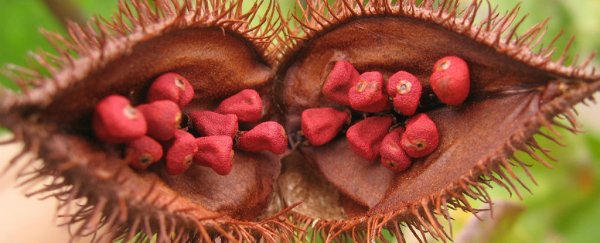Researchers have discovered some rather special properties in the natural food additive, annatto: properties that can block the development of certain skin cancer cells in mice.
It would appear that annatto - which was used by ancient tribes as body paint, but is now more likely to be found as food colouring - contains a compound that prevents the formation of cancer cells caused by ultraviolet radiation. The compound in question is called bixin, and it was discovered as part of tests looking for molecules to activate the body's Nrf2 pathway, which helps strengthen human cells against exposure to carcinogens.
Once the discovery was made by a team from the University of Arizona College of Pharmacy, tests were begun on mice in the laboratory. The animals that were injected with bixin showed much less of a reaction to UV radiation than those that weren't, which supports the theory that the compound blocks skin cancer cells in some way.
Georg Wondrak, who headed up the study, believes it induces cells to produce protective antioxidants and repair factors - cancerous cells are prevented from forming in the first place, rather than coming under attack once they exist. "[I]f you suppress sunburn, you can prevent the formation of cancer. That's the rationale," Wondrak told Barbara Grijalva at Tucson News.
The next step is of course to see if the same effect can be reproduced in humans. That's a process that can take some time, but considering that annatto is already approved by the US Food and Drug Administration (FDA) as safe for human consumption, it means there may be fewer regulatory hurdles to jump over than normal.
Ultimately, annatto could prove a key ingredient of a new super-sunscreen, but one that works from the inside out, rather than being smeared over the skin, and the researchers behind the discovery think treatments could be ready in around five years.
Eventually, foods may have annatto added to protect against skin damage, photoaeging (damage done by UV exposure), and skin cancer. "We only know that our compounds can protect against sunburn through a very interesting, novel mechanism," Wondrak explained to Tucson News. "It helps cells to mount a stress response that protects them against skin damage by UV light: sunburn."
Currently, 2-3 million non-malignant skin cancers and 132,000 malignant skin cancers are diagnosed each year across the world.
The research has been published in the journal Free Radical Biology and Medicine.
